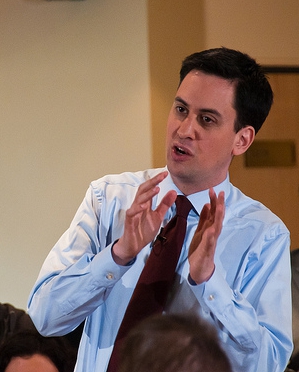 Why might Labour now be thinking of committing to a referendum on EU membership? The obvious factor is the upcoming European elections, argues Simon Usherwood. Even if most voters are indifferent about voting and oblivious about the issues, Labour feels that it needs to build momentum in the run-up to the general election.
Why might Labour now be thinking of committing to a referendum on EU membership? The obvious factor is the upcoming European elections, argues Simon Usherwood. Even if most voters are indifferent about voting and oblivious about the issues, Labour feels that it needs to build momentum in the run-up to the general election.
The reports that the Labour is considering offering a referendum on EU membership is potentially the most significant step in the evolution of British European policy during this parliament. If it does come to pass in the next few weeks then it will mark a decisive shift in the terms of the British debate.
Of course, the referendum issue is that that long been with us, ever since the boxing-in of the debate on membership of the Euro in the late 1990s saw all parties commit to a vote. What would be different in this case is that rather than being a vote about something that hasn’t yet happened (as was the case with the Tories’ passing intentions on the Lisbon treaty), this would be about the status quo. Moreover, it would not be about some aspect of integration, but the entire process.

The reason a Labour commitment would be so important is that this is the party that is most likely to hold the balance of power after the general election. It might be argued that one of the reasons that David Cameron has let himself be pushed around quite so much by his backbenchers is that he has not entertained very strong hopes of returning to number 10 next May: recall that his promise in last January’s speech was hedged with caveats, not least the requirement for a single-party, Tory government.
When Cameron made that pledge, Ed Milliband came under a lot of pressure from his party and the media to match it. That he didn’t reflects both his ideological position and a recognition that his situation is rather different from Cameron.
The key point to remember in all of this is that the EU is not a priority for all that many voters: IPSOS Mori polling points instead to more day-to-day matters as employment, health, welfare and education as key concerns. If Milliband had offered a vote on the same terms as Cameron – renegotiation within two years of the election, then a referendum – then he would in all probability be committing himself to spending half his term in office on an issue that at best would win him a handful of votes. Much more likely, it would prove a massive distraction for any of his other plans for government and it could end with him leading the UK out of the EU, and spending the second half of his term trying to deal with the fall-out.
That hasn’t changed in the past year, so why might Labour be moving now on the issue? The obvious factor is the European elections. Even if most voters are indifferent about voting and oblivious about the issues, Labour needs to build its momentum in the run-up to the general election. With UKIP likely to do well once more, the referendum issue is a stick with which Labour can be handily beaten, especially if last week’s figures on immigration further stoke UKIP’s claims about open borders. Some vague promise of a referendum down the line (which seems to be the current suggestion) would close down the issue and allow Labour to focus on other areas of policy, where they have more of a chance to impress.
However, even with a very carefully worded statement, Labour risks putting itself back into the position that the Conservatives almost managed to put them into last spring. Let’s assume that the commitment is a renegotiation at some point during the next parliament, after which Labour would offer a vote: this is probably the bare minimum that could be said without it being laughed down. Even this modest step would attract calls from eurosceptics to firm it up and set a date (which is the sole attraction of Cameron’s position), something that Milliband would find hard to provide a good reason for not doing: if renegotiation is policy, then why hang around? Very quickly, this would lead to a locking-in on a date and all the consequences mentioned above.
The final paradox in all of this is that Labour has seen off this pressure before, in the wake of Cameron’s speech. Milliband took a pragmatic stance that he wasn’t going to be bounced into anything and eventually the debate moved on. Looking back over the past 12 months, it’s hard to see how it has really damaged Labour.
And yet the shadow of elections looms large in such matters. Remember that Blair’s commitment on a vote on the Constitutional Treaty came in the run-up to the 2004 European elections, just as the Euro referendum promises prefigured the 1997 election. In both those cases, the issue got kicked into touch, albeit more by chance than design. It is much harder to see that happening in the current situation and all involved might do well to consider that in the weeks to come.
Note: This article gives the views of the author, and not the position of the British Politics and Policy blog, nor of the London School of Economics. Please read our comments policy before posting.
About the Author
 Simon Usherwood is Senior Lecturer in Politics at the University of Surrey. He is coordinator of the UACES Collaborative Research Network on Euroscepticism and co-author of The European Union: A Very Short Introduction (OUP 2013). He tweets @Usherwood.
Simon Usherwood is Senior Lecturer in Politics at the University of Surrey. He is coordinator of the UACES Collaborative Research Network on Euroscepticism and co-author of The European Union: A Very Short Introduction (OUP 2013). He tweets @Usherwood.








3 Comments